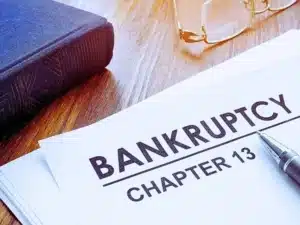
When Can You Reinstate Chapter 13 After Dismissal?
There are a variety of steps debtors can take to reinstate Chapter 13 after dismissal in Nevada. Understanding the reasons for dismissal is crucial, as it allows debtors to address the root cause. Typically, debtors must wait 180 days before refiling, emphasizing the importance of utilizing this time to rectify issues that led to dismissal. Filing a motion for reinstatement is the first formal step to revive the case. This involves presenting a compelling argument to the bankruptcy court, demonstrating a resolution to previous issues and a viable path forward.

Engaging the services of a skilled bankruptcy attorney is invaluable during this process. Attorneys offer legal experience, thoroughly evaluate dismissal reasons, and prepare necessary documentation. The court evaluates the motion, considering the debtor’s efforts to rectify prior issues and the likelihood of a successful Chapter 13 reorganization. If successful, the court reinstates the bankruptcy case, allowing debtors to resume their structured repayment plan.
Alternatively, if reinstatement is not feasible, debtors can explore other options, such as Chapter 7 bankruptcy, debt negotiation with creditors, or financial counseling. The keys to a successful reinstatement are proactive action and seeking professional guidance to navigate the intricacies of bankruptcy law and secure a more stable financial future.
What Is Chapter 13 Bankruptcy?
Chapter 13 bankruptcy in Nevada is a legal avenue designed to provide individuals with a structured framework for managing and repaying their debts. Governed by federal law, Chapter 13 allows debtors to reorganize their financial obligations while retaining their assets. Unlike Chapter 7, which involves liquidation, Chapter 13 establishes a repayment plan spanning three to five years. Debtors propose a plan detailing how they will repay creditors, often prioritizing secured debts and addressing arrears.
This form of bankruptcy is particularly suitable for individuals with regular income seeking to prevent foreclosure, trying to catch up on mortgage payments, or managing tax debt. It offers a viable path to financial recovery, allowing debtors to regain control of their finances while preserving their assets. The success of Chapter 13 hinges on adherence to the proposed repayment plan and fulfilling court requirements, providing a practical and structured approach to debt resolution in Nevada. When
How Does a Chapter 13 Dismissal in Nevada Work?
Filing for Chapter 13 bankruptcy can be a lifeline for individuals seeking to reorganize their debts and regain financial stability. However, there are instances where a Chapter 13 case may face dismissal. Understanding the process, reasons for dismissal, and the subsequent steps one can take in Nevada is crucial for those navigating the complex terrain of bankruptcy.
Common Reasons for a Dismissal in a Chapter 13 Bankruptcy
While Chapter 13 provides a structured plan for debt repayment, several factors may lead to the dismissal of a bankruptcy case. Understanding the common reasons for dismissal in a Chapter 13 bankruptcy in Nevada is essential for individuals seeking financial relief through reorganization. Common reasons include failure to make plan payments, incomplete paperwork, not meeting eligibility criteria, or failure to attend mandatory credit counseling sessions. It’s essential to address these issues promptly to avoid dismissal.
Failure to Make Plan Payments
One prevalent reason for dismissal is the failure to make plan payments. The heart of Chapter 13 bankruptcy involves a debtor proposing a repayment plan to creditors, outlining how he or she will repay debts over a specified period, usually three to five years. Regular and timely payments are crucial for the success of the plan. Missing payments can result in the court dismissing the case, as it undermines the fundamental purpose of Chapter 13—providing a structured means for debt repayment.
Incomplete/Inaccurate Paperwork
Incomplete or inaccurate paperwork is another common cause for dismissal. Bankruptcy filings require extensive documentation, including detailed financial statements, a comprehensive list of creditors, and a proposed repayment plan. Any oversight or error in these documents can lead to a dismissal. Therefore, meticulous attention to detail and accuracy is imperative when preparing and submitting paperwork for a Chapter 13 case.
Ineligibility
Failure to meet eligibility criteria can result in dismissal.
Non-Compliance
Non-compliance with court orders and directives is another factor. Debtors must adhere to the court’s instructions throughout the bankruptcy process. Ignoring court orders or failing to provide requested information can lead to dismissal, emphasizing the importance of open communication and cooperation with the court.
Addressing these common reasons for dismissal promptly is crucial to maintaining the viability of a Chapter 13 case. If a dismissal does occur, debtors must take immediate action to rectify the issues that led to the dismissal, whether by making outstanding payments, correcting paperwork errors, or fulfilling other court requirements.
In Nevada, debtors should be aware of the local bankruptcy rules and procedures to navigate the system effectively. Seeking the guidance of a knowledgeable bankruptcy attorney is valuable in addressing and resolving the challenges that may arise in a Chapter 13 case. Attorneys can provide insights, offer solutions, and assist debtors in avoiding pitfalls that could lead to dismissal, ultimately facilitating a smoother and more successful bankruptcy process.
Immediate Actions to Take After Dismissal
Upon dismissal, debtors must act promptly to address the situation. Immediate actions to take after your bankruptcy is dismissed may include:
- Assess the Reason for Dismissal: Understand the specific reasons for dismissal, so you can rectify any shortcomings in the case.
- Consult a Bankruptcy Attorney: Seek advice from a qualified bankruptcy lawyer to evaluate options and guide you to the best course of action.
- Review Finances: Assess your financial situation to determine whether pursuing bankruptcy is still a viable option.
Once you have taken these steps, you can determine whether seeking reinstatement is your best option.
Time Limits Imposed by the Bankruptcy Code in Nevada
The Bankruptcy Code imposes time limits and waiting periods after a dismissal, adding an extra layer of complexity to the process. In Nevada, debtors must wait at least 180 days before refiling for Chapter 13 after dismissal. This waiting period is intended to encourage debtors to address the issues that led to the dismissal and to ensure a more informed and considered decision before attempting to restart the bankruptcy process.
Filing a Motion for Reinstatement
To revive a dismissed Chapter 13 case in Nevada, debtors have the option to file a motion for reinstatement. This involves presenting compelling reasons to the bankruptcy court for reinstating the case. The court will evaluate the motion and make a determination based on the merits of the arguments presented. Working with an experienced bankruptcy attorney is particularly advantageous during this process.
Court Hearing and Evaluation Process
In Nevada, reinstating a dismissed Chapter 13 bankruptcy involves filing a motion, prompting a court hearing. The court evaluates the motion, considering reasons for dismissal, efforts to rectify issues, and the likelihood of successful reorganization. Working with an attorney enhances the chances of a favorable evaluation, facilitating a smoother reinstatement process.
Benefits of Working With a Bankruptcy Attorney
Navigating the intricacies of a Chapter 13 dismissal and subsequent reinstatement can be challenging, making legal representation invaluable. A bankruptcy attorney can offer several benefits:
- Legal Experience: Attorneys experienced in bankruptcy law possess the knowledge and experience to guide clients through the complexities of the legal system.
- Case Evaluation: A bankruptcy lawyer can thoroughly evaluate the reasons for dismissal, offering insights into the likelihood of reinstatement and strategies to use.
- Document Preparation: Attorneys assist in preparing the necessary documentation and presenting a strong case for reinstatement.
Alternative Options if Reinstatement Is Not Possible
While reinstatement is the primary goal after a dismissal, there are scenarios where it may not be feasible. In such cases, debtors should explore alternative options:
Chapter 7 Bankruptcy: If Chapter 13 is not viable, debtors may consider filing for Chapter 7 bankruptcy, which involves liquidating assets to discharge eligible debts.
Debt Negotiation: Negotiating directly with creditors to establish new repayment terms or settle debts may be an option, avoiding the need for bankruptcy.
Financial Counseling: Engaging in financial counseling can provide valuable insights into budgeting, money management, and alternative methods for debt resolution.
The path to reinstating a dismissed Chapter 13 case in Nevada involves understanding the reasons for dismissal, adhering to time limits, and navigating a potentially complex legal process. Seeking the assistance of a knowledgeable bankruptcy attorney is instrumental in presenting a strong case for reinstatement or exploring alternative avenues for debt relief. For those






